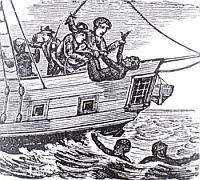 On November 29, 1781, the British slave ship Zong was desperately short of potable water, in part due to an error in navigation and in part due to an incompetent cooper. Captain Luke Collingwood, in command of the ship, ordered his crew to throw one-third of the ship’s cargo overboard — a shipment of Africans bound for slavery in Jamaica. Between November 29th and December 1st, 132 Africans, still bound in shackles, were thrown overboard and drowned. The ship and its human cargo had been insured in England for £8,000. After the ship finally arrived in port, the ship’s owners filed an insurance claim for the Africans killed by the officers and crew, claiming general average.
On November 29, 1781, the British slave ship Zong was desperately short of potable water, in part due to an error in navigation and in part due to an incompetent cooper. Captain Luke Collingwood, in command of the ship, ordered his crew to throw one-third of the ship’s cargo overboard — a shipment of Africans bound for slavery in Jamaica. Between November 29th and December 1st, 132 Africans, still bound in shackles, were thrown overboard and drowned. The ship and its human cargo had been insured in England for £8,000. After the ship finally arrived in port, the ship’s owners filed an insurance claim for the Africans killed by the officers and crew, claiming general average.
General average dates back to at least the 6th century AD and is the principle that all parties share in the risks of a sea voyage. If a ship is caught in a storm and cargo is thrown overboard to save the ship and the rest of the cargo, under general average the cost of the lost cargo would be shared by the owners of the cargo and the ship. Because the Zong, was insured and because, the owners argued, the murders of the Africans were committed to “save the ship and the rest of the cargo,” the owners claimed that they were due compensation from the underwriters. Grotesquely, if the captain had simply allowed the Africans to die onboard the ship and then pitched them over the side, then the underwriters would owe the ship nothing. Slaves dying during a voyage was considered a cost of doing business. The murder of the Africans on the Zong was a calculated business decision to attempt to maximize owner’s return on the voyage.
The underwriters refused to pay the claim. The shipowners sued. In the law suit that followed, John Lee, the solicitor general, argued that the killings were not a matter of murder or morality but solely involved a question of property and insurance:
What is this claim that human people have been thrown overboard? This is a case of chattels or goods. Blacks are goods and property; it is madness to accuse these well-serving honourable men of murder. They acted out of necessity and in the most appropriate manner for the cause. The late Captain Collingwood acted in the interest of his ship to protect the safety of his crew. To question the judgement of an experienced well-travelled captain held in the highest regard is one of folly, especially when talking of slaves. The case is the same as if wood had been thrown overboard.
In March of 1783, the jury found on behalf of the ship owners.
The Zong massacre, however, resonated throughout British society. While slavery in Britain had been effectively abolished in 1772, the international slave trade continued to be big business and was considered critical to the support of the British sugar islands of the West Indies. The Zong massacre, which showed the face of slavery, would become a rallying cry for British abolitionists. The Society for Effecting the Abolition of the Slave Trade was organized in London in 1787. The Slave Trade Act 1807 abolished the British slave trade and the Slavery Abolition Act 1833 abolished slavery throughout most of the British Empire.

Those were sad days indeed! However blackbirding in the pacific lasted nearly 100 yrs longer!